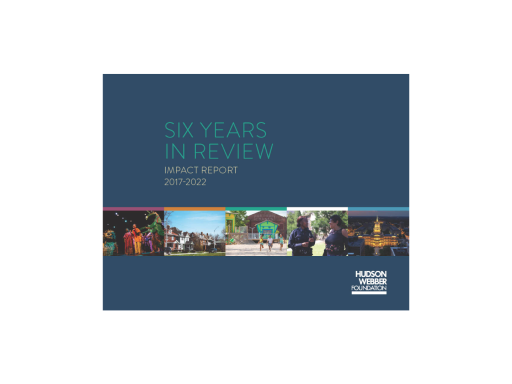Hudson-Webber Foundation Shares 6-Year Impact Report
In 2017, the Hudson-Webber Foundation launched a new strategic framework to ensure that it would continue to meaningfully contribute to its mission of improving the quality of life of Detroiters.
In 2017, the Hudson-Webber Foundation launched a new strategic framework to ensure that it would continue to meaningfully contribute to its mission of improving the quality of life of Detroiters.

Hudson-Webber Foundation has shared its six-year impact report, highlighting milestone achievements and new funding strategies aimed at improving the quality of life of Detroiters.
Six Years in Review: Impact Report 2017-2022 is the first report of its kind for the foundation and also documents and reflects on lessons learned from nonprofit partners and key external stakeholders to inform the ongoing development of the Hudson-Webber Foundation.
“We express our heartfelt appreciation to all who participated in the review and whose insights and feedback will continue to be invaluable in helping to shape the direction of the foundation’s work,” Melanca Clark, president and CEO of the Hudson-Webber Foundation and CMF’s Board Chair said. “This report presents us an opportunity to acknowledge and celebrate the remarkable contributions of our non-profit grantee partners who have been instrumental in driving positive change in Detroit.”
According to the report, the Hudson-Webber Foundation launched a new strategic framework in 2017 to ensure that it would continue to meaningfully contribute to its mission and included four guiding principles for the foundation, including:
The guiding principles are focused on funding priorities such as Arts and Culture, Built Environment, Community and Economic Development and Safe and Just Communities.
The report highlights key objectives for each funding priority as well as total funding over six years, number of grants, median investment for the funding areas, partner organizations and initiatives, and more.
Key highlights from the report include:
The Michigan Justice Fund (MJF)
Hudson-Webber Foundation supported spearheading MJF, a funders collaborative housed by the Community Foundation for Southeast Michigan (CFSEM). According to the report, Hudson-Webber Foundation used collaborative investment vehicles to explore common priorities and interests and develop strategies for advancing effective justice policy and fostering continued shared learning. The MJF, comprised of 15 Michigan-based and national funders, has contributed more than $20 million to advance criminal legal reform and the economic mobility of individuals with criminal convictions in Michigan.
Work with Communities to Address Issues in Police Practices
In partnership with the CFSEM, Hudson-Webber Foundation launched the Community Policing Innovations Initiative. The goal of the initiative is to provide the guidance and support necessary for local communities, in partnership with local law enforcement, to develop community-driven, substantive and pragmatic changes in the way that policing and public safety services are provided.
Advancing Neighborhood Economic Growth Projects
The foundation has invested more than $10.3 million in neighborhood economic growth strategies and projects, specifically for initiatives where neighborhood residents hold seats at the table.
The Building the Engine of Community Development in Detroit is a citywide initiative designed to strengthen Detroit neighborhoods by building a coordinated, equitable system for community development work throughout the city.
Detroit Riverfront Redevelopment
The Hudson-Webber Foundation has awarded $2 million to the Detroit Riverfront Conservancy to advance the conservancy’s vision for developing a world-class park and to support community engagement in park planning, design and programming.
The strategic investment allowed for continued redevelopment and improvements to public access to 5.5 miles of the Detroit International River with recreational paths, park amenities and spaces for inclusive recreational and cultural events.
Supporting Arts & Culture Experiences
The foundation committed more than $3 million in operating support grants to 31 arts and culture organizations in metro Detroit through the Detroit Arts Support (DAS) program to deliver and sustain high-quality, accessible cultural experiences to the community.
According to the report, aside from the DIA millage, DAS is the largest public or philanthropic investment in southeast Michigan’s arts and culture sector and has played a significant role in the stabilization of the sector.
The report also highlights future direction and priorities for the foundation and learning themes that emerged through consultant interviews with nonprofit partners and stakeholders.
Priority action items for the foundation include:
Want more?
Read the full impact report.